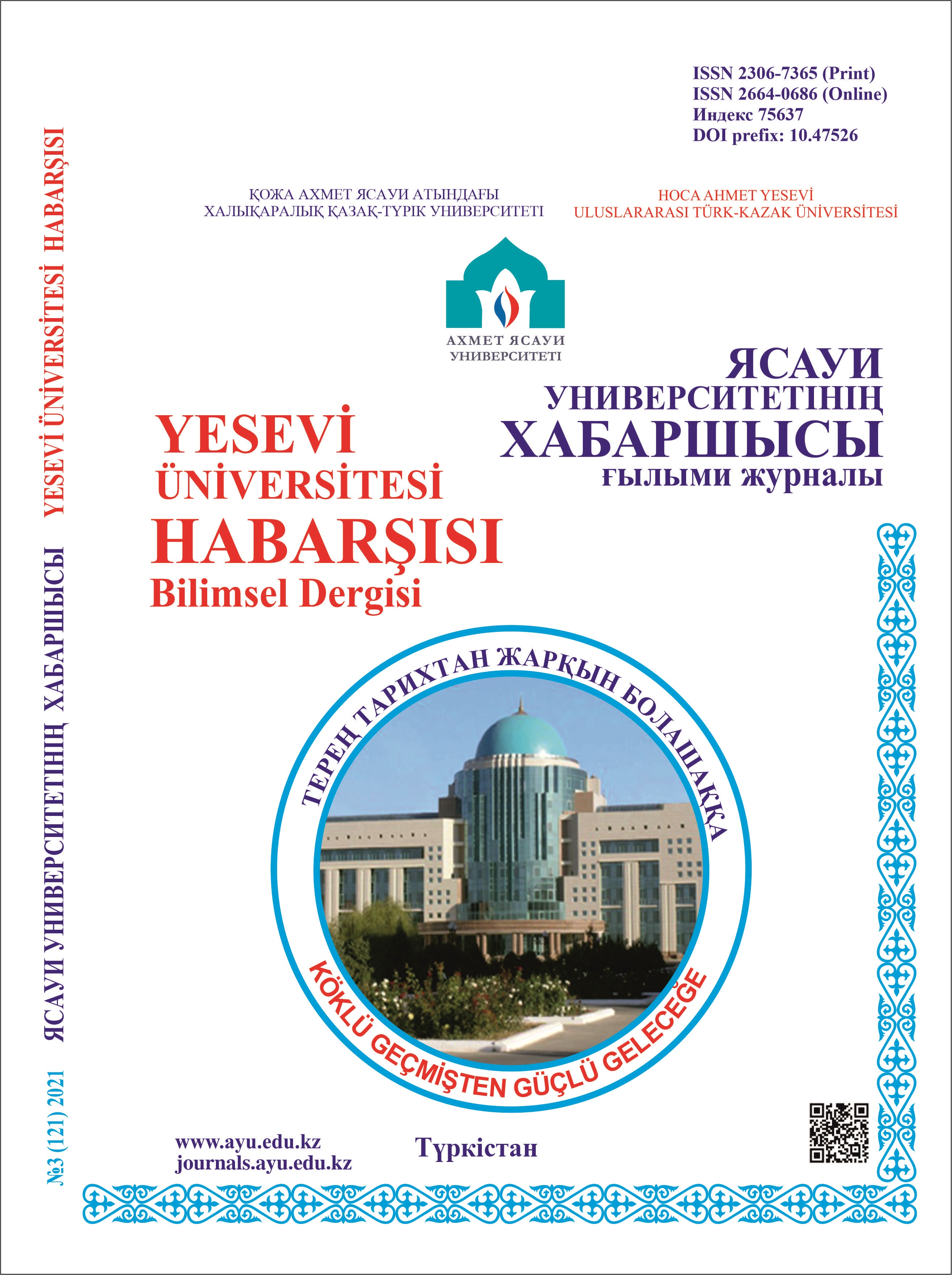IMPROVING THE RESEARCH COMPETENCE OF POST-GRADUATE STUDENTS AT THE UNIVERSITY OF KAZAKHSTAN
249 257
Keywords:
postgraduate education, research competence, research activity, academic English, scientific writing.Abstract
This article explores strategies to enhance the research competence of postgraduate students in Kazakhstan universities, aiming to strengthen national intellectual capacity and facilitate its integration into the global academic community. Focusing on Abai Kazakh National Pedagogical University (KazNPU) from 2020 to 2024, the study investigates postgraduate student participation in research activities and identifies key barriers hindering their engagement. Employing a mixed-methods approach, the research combines quantitative and qualitative data gathered through surveys, interviews, and institutional records. The study specifically examined master's and doctoral student participation in research projects, conference attendance, and academic journal publication rates.
Key findings revealed that only 41.5% of postgraduate students actively participated in research projects. Participation in international conferences was notably low at 3.6%, while attendance at university-organized conferences reached 37.41% and national conferences 15.23%. Publication rates were also limited, with only 23.57% of students publishing at the national level. Of those publications, 63.96% appeared in domestic journals, and a mere 12.47% were published in international journals indexed in databases such as SCI, IE, and CSCD. These results highlight a significant gap between domestic and international research output. The article proposes actionable recommendations to address these challenges, including establishing internal grant schemes to support student research projects and international conference attendance, providing targeted academic English language training to improve scientific communication skills, and publication in reputable international journals. Implementing these initiatives is expected to align postgraduate research activities more closely with national and international scientific priorities, thereby improving the quality of postgraduate education in Kazakhstan, enhancing its global academic competitiveness, fostering a more dynamic research environment, and strengthening Kazakhstan's position within the global scientific community.
References
REFERENCES
Qazaqstan Respublikasynda bilim berudi jane gylymdy damytudyń 2020-2025 jyldarga arnalgan memlekettik bagdarlamasy [State program for the development of education and science of the Republic of Kazakhstan for 2020–2025]. [Electronic resource]. URL: https://adilet.zan.kz/kaz/docs/P1900000988 (date of access 03.02.2024) [in Kazakh]
Бозыев Р.С. Педагогикадағы ғылыми зерттеулердің әдістемесі: ұжымдық монография – Нұр-Сұлтан: Планета, 2020. – Б. 207–208. 3. Purwati R., Liestari S.P., Suwandi T., Wulan A.R., Utari S. Profile of learning experiences and students’ scientific inquiry skills in science subjects // Proceedings of the International Conference on Educational Assessment and Policy (ICEAP 2020). – Paris: Atlantis Press, 2020. – №545. – P. 22–28. https://doi.org/10.2991/assehr.k.210423.059 4. Idris N., Talib O., Razali F. Strategies in mastering science process skills in science experiments: a systematic literature review // Jurnal Pendidikan IPA Indonesia. – 2022. – Vol. 11, №1. – P. 155–170. https://doi.org/10.15294/jpii.v11i1.32969.
Lubiano M.L.D., Magpantay M.S. Enhanced 7E Instructional model towards enriching science inquiry skills // International Journal of Research in Education and Science. – 2021. – Vol. 7, №3. – P. 630–658. https://doi.org/10.46328/ijres.1963.
Bessarab A., Sadivnychyi V., Ilchenko A., Ripka G., Shaposhnikova V., Tainel E. Development of students’ research activity during studying at higher education institutions // Studies of Applied Economics. – 2021. – Vol. 39, №5. – P. 315–325. https://doi.org/10.25115/eea.v39i5.4866.
Musabekova G., Chakanova S., Boranbayeva A., Utebayeva A., Kazybayeva K., Alshynbayev K. Structural conceptual model of forming readiness for innovative activity of future teachers in general education school // Opción. – 2018. – Vol. 33, №85. – P. 217–240.
Truran P. The development of creative thinking in graduate students doing scientific research // Educational Technology Publications. – 2016. – Vol. 43. – P. 41–46.
Kosshygulova A., Sarsenbayeva L., Karakulova Z. Pedagogical and psychological conditions for the organization of independent work of students // European Journal of Contemporary Education. – 2022. – Vol. 11, №4. – P. 1134–1146. https://doi.org/10.13187/ejced.4.1134.
Prodromou T., Lavicza Z. Inquiry-Based Learning in Statistics: When Students Engage with Challenging Problems in STEM Disciplines. In: STEM Education: An Emerging Field of Inquiry. – Leiden: BRILL, 2020. – P. 117–131. https://doi.org/10.1163/9789004391413_008.
Berikkhanova A., Sapargaliyeva B., Ibraimova Zh., Wilson E. Conceptualising the integration of action research into the practice of teacher education universities in Kazakhstan // Education Sciences. – 2023. – Vol. 13, No. 10. https://doi.org/10.3390/educsci13101034.
Clark L. Bridging the Authority Gap: Partnerships Between Postgraduates and Undergraduates. – London: Routledge, 2021. – 200 p.
Harrowell J., Davies T., Disney T. Creating Space for Failure in Geographical Research // The Professional Geographer. – 2018. – Vol. 70, №2. – P. 230–238.
Sihynbaeva, J.S., Joldasbekova D.A. Bolashaq arnaiy pedagogtardyn kasibi qyzmetin jetildiruge daiyndygyn arttyru [Increasing the readiness of future special teachers to improve their professional activities] // Ahmet Iasauı atyndagy universitetinin habarshysy. – 2023. – №3(129). – B. 224–238. [in Kazakh]
15.Salavati S. Use of digital technologies in education: The complexity of teachers’ everyday practice: dis. – Växjö: Linnaeus University, 2020. – 200 p. 16. Pramita S.D., Eka C.P., Ari W., Diana R. Inquiry ability of students to develop cognitive ability in learning hydrostatic pressure // Research in Physics Education. – 2023. – Vol. 2, №2. – P. 138–153.
Zhang Y., Jiang Y. Investigation and analysis on the cultivation of academic competence of postgraduates // Open Access Library Journal. – 2021. – Vol. 8, №10. – P. 1–12. https://doi.org/10.4236/oalib.1107967.
Morrison M.E., Lom B., Buffalari D., Chase L., Fernandes J.J., McMurray M.S., Stavnezer A.J. Integrating Research into the Undergraduate Curriculum: 2. Scaffolding Research Skills and Transitioning toward Independent Research // Journal of Undergraduate Neuroscience Education. – 2020. – Vol. 19, №1. – P. A64–A74.
Matilainen R., Nuora P., Valto P. Student Experiences of Project-Based Learning in an Analytical Chemistry Laboratory Course in Higher Education // Chemistry Teacher International. – 2021. – Vol. 3, №3. – P. 229–238.
Partanen L. How Student-Centred Teaching in Quantum Chemistry Affects Students’ Experiences of Learning and Motivation: Self-Determination Theory Perspective // Chemistry Education Research and Practice. – 2020. – Vol. 21, №1. – P. 79–94.

